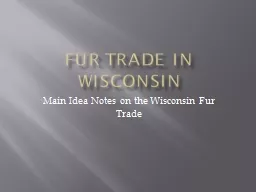PPT-Mechanisms for Implementation of Trade
Author : liane-varnes | Published Date : 2017-06-08
International InterTribal Trade amp Investment Organization Thompson Rivers Law School Kamloops BC November 12 2016 James C Collard PhD Citizen Potawatomi Nation
Presentation Embed Code
Download Presentation
Download Presentation The PPT/PDF document "Mechanisms for Implementation of Trade" is the property of its rightful owner. Permission is granted to download and print the materials on this website for personal, non-commercial use only, and to display it on your personal computer provided you do not modify the materials and that you retain all copyright notices contained in the materials. By downloading content from our website, you accept the terms of this agreement.
Mechanisms for Implementation of Trade: Transcript
Download Rules Of Document
"Mechanisms for Implementation of Trade"The content belongs to its owner. You may download and print it for personal use, without modification, and keep all copyright notices. By downloading, you agree to these terms.
Related Documents














